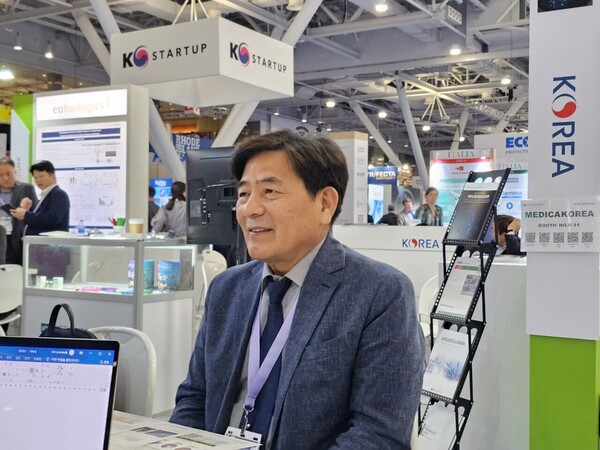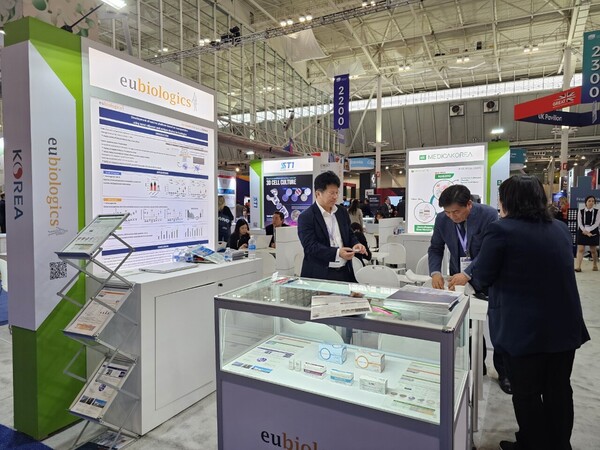During the Covid-19 pandemic, the global spotlight naturally gravitated towards vaccine manufacturing technology. As a crucial element of epidemic prevention strategies, vaccines were perceived not merely as pharmaceutical products, but as a symbol of national sovereignty and a formidable defense mechanism.
As the pandemic has transitioned into an endemic state, the urgency for localizing vaccine manufacturing technology has somewhat diminished.
Nevertheless, a few companies persistently pursue domestic vaccine development.
EuBiologics is one of them, poised to unveil the interim findings of its phase 3 clinical trial for a Covid-19 vaccine later this month.
Furthermore, Eubiologics is proactively gearing up for the next phase by leveraging the platform technology that facilitated the development of their vaccines. Their objective is to enable substantial technology transfer on a large scale, encompassing not only the vaccine products but the underlying technology as well. In pursuit of this goal, Eubiologics recently participated in the 202 BIO International Convention (BIO 2023) held in Boston, Massachusetts, where they established a promotional booth to showcase their advancements.
Korea Biomedical Review met with EuBiologics CEO Baik Yeong-ok on the sidelines of BIO 2023 to learn more about his blueprint for vaccine development.

Question: Could you elaborate on your pipeline and specify the progress you are interested in?
Answer: EuBiologics’ platform technologies can be broadly divided into two categories: EuVCT (EuBiologics Vaccine Conjugation Technology) for bacterial vaccines, and EuIMT (EuBiologics Immune Modulation Technology) and SNAP (Spontaneous Nanoliposome Antigen Particle) for viral vaccines.
EuVCT is a technology that maximizes the antibody production performance of polysaccharides with weak antigenicity by conjugating carrier proteins to polysaccharide antigens, and EuIMT is an immune enhancement technology that binds TLR4 receptors to recombinant antigens to induce antibody production performance and cellular immunity of vaccines. We have our own immune enhancer (adjuvant) EcML, created through EuIMT.
The vaccines being developed through EuVCT include the typhoid vaccine (EuTCV), and pneumococcal vaccine (EuPCV).
Using EuIMT and SNAP, we are working on the meningococcal quadrivalent/5-valent conjugate vaccine (EuMCV), Covid-19 vaccine (EuCorVac-19), respiratory syncytial virus (RSV) vaccine, and herpes zoster vaccine (HZV).
Q: What is the current status of clinical development for the EuVCT-powered vaccine pipeline?
A: For the typhoid vaccine EuTCV, we have completed a phase 3 clinical trial and are conducting additional trials in three African countries. This is because we need 3,000 cases of safety data to receive prequalification (PQ) from the World Health Organization (WHO).
Funded by the Bill & Melinda Gates Foundation and RIGHT Foundation, the phase 1 study of the meningococcal vaccine, EuMCV, was completed at Seoul National University Hospital. We plan to begin a phase 3 study later this year. As with the typhoid vaccine, we are pursuing WHO PQ certification for EuMCV to supply it to UNICEF.
We completed the phase 1 study of pneumococcal vaccine EuPCV and are aiming for a license-out for the quadrivalent vaccine. For the pentavalent vaccine, we are looking for a collaborative R&D partner to enter a phase 3 trial in the fourth quarter.
EuVCT is qualified as a vaccine development platform because the candidates developed through EuVCT have completed phase 3 trials. We are considering selling the carrier protein rCRM197, which is the core of our platform, or licensing out the vaccine. We are also willing to work with partners to bring the vaccine to the European market. We expect EuVCT technology to become a pillar of EuBiologics' business in the future.
Q: What is the status of the pipeline development utilizing the immune booster manufacturing technology EuIMT? When do you expect to commercialize the Covid-19 vaccine EuCorVac-19?
A: At the end of this month, we will receive the interim results of the phase 3 EuCorVac-19 trial in other countries such as the Philippines and Africa. The deadline for the government-funded Covid-19 treatment and vaccine development project is also this month. Safety data comparing the frequency of adverse events with a control vaccine will be available. As in the case of previously licensed vaccines, we believe that the interim results of the phase 3 study will be sufficient to apply for a license in the Philippines.
However, the Korean Ministry of Food and Drug Safety (MFDS) has stated that it is not acceptable as a license application because the study was not on Koreans. During the Covid-19 pandemic, there was no control vaccine available in Korea, and the government said it was difficult to get it. So we went abroad, which is a regrettable point. Even if we get a license from the Philippines first and bring it into Korea, we have to do comparative clinical trials with a locally licensed vaccine.
So, after discussions with the MFDS, we decided to check the vaccine’s preventive effect against the Omicron XBB variant, which is an Omicron sub-variant. It is expected that we will apply for approval as a monovalent vaccine against this variant or as a bivalent vaccine that can prevent even the initial Covid-19 virus. If we complete the local phase 1 trial with the bivalent vaccine later this year or early next year, we will compare it with the bivalent vaccine of Pfizer or Moderna.

Q: SK Bioscience, which developed the domestic Covid-19 vaccine SKYCovione, utilized GSK's immune booster. Why do you continue to develop vaccines with your immune enhancer and what is your competitive advantage?
A: EuIMT is a TLR4 agonist that works by increasing immunity. It supports cellular immunity, but it is also highly capable of producing antibodies. This is why we started developing a COVID-19 vaccine in 2020. If we hadn't developed our own immune booster in the first place, we wouldn't have started developing the vaccine.
Recently, there has been increasing interest in TLR4 receptors, and we are the only company that can produce TLR4 receptors through genetic recombination. Compared to the existing synthetic and fermentation manufacturing methods, we have increased the economic efficiency and maintained the quality such as purity.
After our Covid-19 vaccine entered the phase 3 study, more and more companies expressed interest in our technology. They have also started to offer to utilize it in their products. It is meaningful in that they are trying to buy a Korean-made immune enhancer manufacturing technology in foreign countries. In the future, we expect to be able to cooperate with multinational pharmaceutical companies through EuIMT technology.
In addition, the company plans to submit a phase 1 IND for an RSV vaccine to the MFDS in September. We are also developing an Alzheimer's disease vaccine, which is currently being tested on mice to evaluate cognition, and we plan to ask physicians to advise on the trial.
Q: You participated in BIO 2023 to promote your various vaccine development platform technologies and pipelines. Please tell us what you expect to gain from the event and future plans.
A: In March, we were encouraged to see Merck and OPKO Health sign a technology transfer agreement worth about $870 million for an Epstein-Barr virus (EBV) vaccine candidate. It gave us the confidence that we can do it too, and that we can do a 1 trillion won ($783.8 million) license out for vaccines in addition to new drugs.
We met more than 20 companies at the event, especially those who were interested in us, and we talked a lot. It's not always possible to make a deal right away, but I think the seeds have been planted. It's hard to comment on specifics, but I think there will be good results as early as this year.
Related articles
- [Photo News] 2023 BIO International Convention rekindling success as attendees flock back after Covid-19 pandemic
- [Special] EuBiologics to spearhead ‘K-vaccine’ wave at BIO 2023
- [Special] Which Korean companies will be most active at BIO 2023?
- CRO Dream CIS emerges as top helper for K-Bio’s advance to US market
- Osteoarthritis drug maker YiPSCELL met future partners at BIO 2023
- MedySapiens speeds up US genome market entry for rare disease diagnostics
- EuBiologics to seek Philippines approval for EuCorVac-19 this month based on phase 3 interim data
- EuBiologics withdraws application for BTX approval due to missed data submission deadline
- EuBiologics, GC Biopharma to jointly produce cholera vaccine for UNICEF

